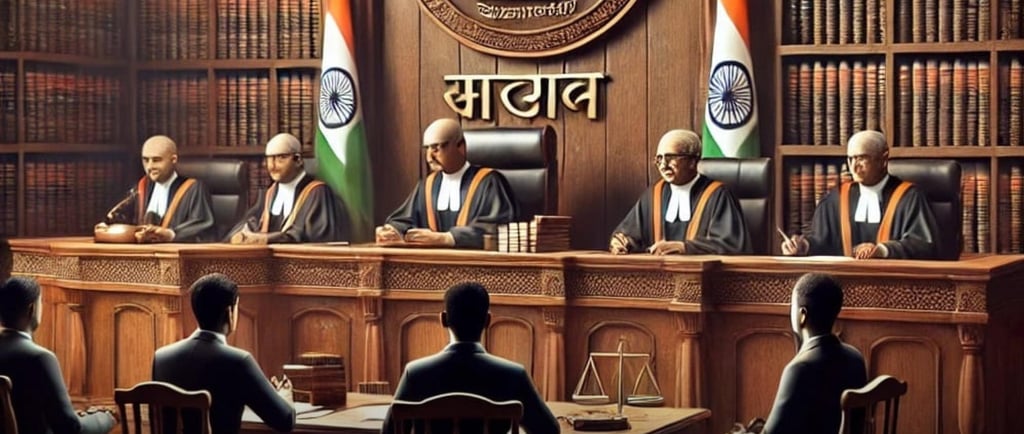Allahabad High Court Cancels Teacher’s Appointment Over Alleged Misrepresentation of Compassionate Grounds
In a significant judgment, the Allahabad High Court recently dismissed a special appeal filed by Shiv Dutt Sharma, whose appointment as an Assistant Teacher was canceled by the Uttar Pradesh education department on allegations of misrepresentation. The case highlights critical issues surrounding appointments made on compassionate grounds and the importance of adherence to procedural rules. The case traces back to 1981, when Shiv Dutt Sharma was initially appointed as a Chowkidar (watchman) on compassionate grounds in a junior high school in Badagaon, Bulandshahar district. This appointment was made following the death of a family member, allowing Sharma to secure a job under the state government’s policy for providing employment to bereaved families. However, the matter took a controversial turn decades later, leading to Sharma’s dismissal just before his retirement in 2019.
1/23/20253 min read


In 1984, three years after his appointment, Sharma applied for permission to pursue a B.Ed. (Shiksha Shastri) degree, a qualification required for teaching positions. The department granted him unpaid leave to undertake the course, with the condition that he would return to his position as Chowkidar after completing his studies. Upon completing his B.Ed., Sharma was later appointed as an Assistant Teacher in 1986 by the District Basic Education Officer, Bulandshahar. This appointment was reportedly made based on a recommendation by the district-level Appointment/Promotion Committee for Teachers of Basic Schools. Sharma continued to serve as an Assistant Teacher for over three decades and eventually rose to the position of Principal.
However, as Sharma approached his retirement date in 2019, discrepancies regarding his initial appointment and subsequent promotion surfaced. In December 2018, the Block Education Officer, Arnia, issued a notice to Sharma, accusing him of concealing material facts about his initial appointment as a Chowkidar. The notice alleged that Sharma had secured his position as an Assistant Teacher without disclosing his earlier appointment on compassionate grounds. Sharma was asked to submit an explanation, failing which departmental proceedings would be initiated against him.
Sharma responded to the notice, denying the allegations. He claimed that his appointment as Chowkidar in 1981 was not commensurate with his educational qualifications at the time, and his promotion to Assistant Teacher was lawful and based on departmental permissions. He further stated that he had obtained his B.Ed. degree with due approval from the education department, and his appointment as a teacher was made following established procedures. Sharma argued that the notice was baseless and lacked merit, particularly given that he was set to retire shortly.
The controversy led to the formation of a three-member inquiry committee by the District Basic Education Officer in February 2019. The committee reviewed the allegations, Sharma’s responses, and related documents. The inquiry report, submitted in March 2019, concluded that Sharma had indeed misrepresented facts regarding his initial appointment as a Chowkidar and his subsequent appointment as an Assistant Teacher. Based on the findings, the District Basic Education Officer issued an order canceling Sharma’s appointment with immediate effect.
Sharma filed a writ petition challenging the cancellation order, but the single-judge bench dismissed his plea in March 2024, upholding the education department’s decision. Sharma subsequently filed a special appeal before the High Court’s division bench, seeking to overturn the judgment.
In the appeal, Sharma’s counsel argued that his appointment as an Assistant Teacher was lawful and in line with the education department’s rules. They contended that Sharma had not concealed any facts and that the promotion was granted after due deliberation by the relevant authorities. The counsel further emphasized that Sharma had served as a teacher for over three decades without any complaints or issues, and the cancellation of his appointment just months before retirement was unjustified and harsh.
The state, however, argued that Sharma’s appointment as an Assistant Teacher violated the conditions under which he was initially appointed on compassionate grounds. They claimed that Sharma’s failure to disclose his previous appointment as a Chowkidar amounted to misrepresentation and fraud. The state also highlighted the findings of the inquiry report, which supported their claims.
After considering the submissions, the division bench comprising Justice Vivek Kumar Birla and Justice Dr. Yogendra Kumar Srivastava dismissed Sharma’s appeal. The court observed that appointments made on compassionate grounds are subject to strict scrutiny to prevent misuse and ensure fairness. It held that Sharma’s appointment as an Assistant Teacher was irregular and obtained through misrepresentation, as he failed to disclose his initial appointment and violated the terms of the compassionate appointment policy.
The judgment underscores the importance of transparency and accountability in public service appointments, particularly those made on compassionate grounds. The court emphasized that while compassionate appointments are designed to provide relief to bereaved families, they cannot be misused to secure undue benefits or bypass established procedures.
The case also raises broader questions about the long-term oversight of such appointments. Despite Sharma’s alleged misrepresentation occurring in the 1980s, it took over three decades for the issue to come to light. This delay highlights potential lapses in monitoring and enforcement mechanisms within the state’s education department.
The ruling serves as a reminder for public servants and authorities to maintain transparency and adhere to procedural requirements. It also emphasizes the need for robust systems to detect and address irregularities in appointments and promotions in government service.
